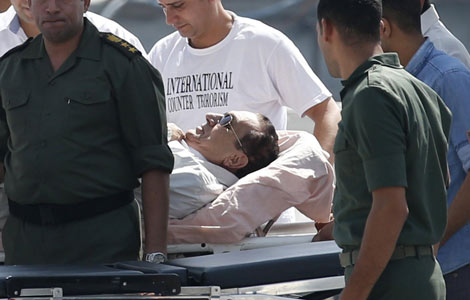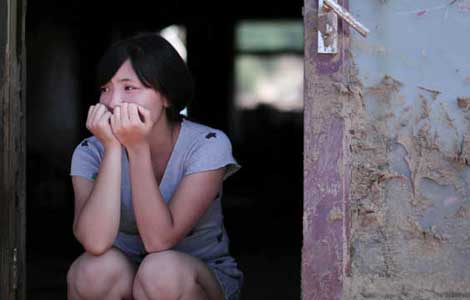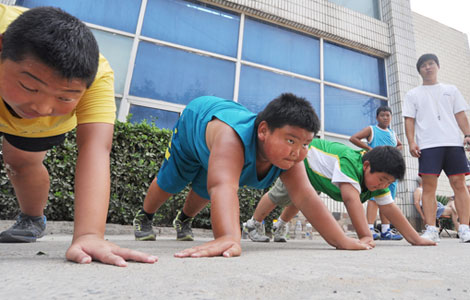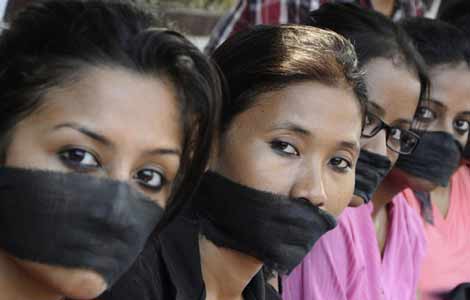Bo insists he did not abuse power
Updated: 2013-08-26 07:23
By An Baijie in Jinan and Zhao Yinan in Beijing (China Daily)
|
||||||||
Evidence suggests fallen official's behavior at court will not merit any lenient punishment
Former Chongqing Party chief Bo Xilai on Sunday denied the charge of abusing power to cover up a murder case involving his wife and to sack a police chief without proper procedures, as the high-profile trial entered its fourth day.
Bo, 64, a former member of the Political Bureau of the Communist Party of China Central Committee, was charged with bribery, embezzlement and abuse of power.
The trial started on Thursday at Jinan Intermediate People's Court, and the court investigation and cross-examination were completed on Sunday morning. The trial is to resume on Monday.
Prosecutors said on Sunday that Bo did not turn himself in, confess his crimes or inform against others. Such compliance can result in more lenient punishment.
Prosecutors presented evidence on the charge of abuse of power against Bo on Sunday, showing that he ordered the investigation of officials in charge of handling his wife Bogu Kailai's intentional homicide case.
She was sentenced to a suspended death sentence in August 2012 for murdering British citizen Neil Heywood on Nov 13, 2011.
The prosecutors' evidence also showed that on Jan 28, 2012, then Chongqing police chief Wang Lijun reported the murder case to Bo, and Bo violated organizational procedures to remove Wang from his post five days later, which led to Wang fleeing to the US Consulate General in Chengdu on Feb 6, 2012.
Wang, 53, was sentenced to 15 years in prison in September 2012 for bending the law for selfish ends, defection, abuse of power and accepting bribes.
Wang appeared in court on Saturday and testified that Bo hit him in the face and smashed a cup in front of two other local officials to threaten them into silence about the murder case. Bo said on Sunday that smashing the cup did not necessarily show his opposition to probing the murder case. It only reflected his lack of self-restraint.
Bo insisted that Wang's testimony was falsified and that as a defector "with extremely bad character", Wang is not qualified to testify.
But the chief judge reminded Bo that it was him as well as the prosecutors who applied for Wang's presence at the court. Bo said "thanks" to the judge afterward.
Bo's defense lawyers questioned the objectivity and authenticity of Wang's testimony.
"The moment that he (Wang) appeared in court, he showed grave hostility toward the defendant, saying that he was a victim of the defendant rather than a witness," a defense lawyer said.
But prosecutors said Wang's testimony was consistent with his previous statements, which could also be verified by the testimony of other witnesses and documentary evidence.
The prosecutors also said that Bo allowed his wife, who was not a civil servant, to take part in discussions about how to handle Wang's defection.
Bo sanctioned his wife's suggestion to ask a hospital to fake a diagnosis that Wang had mental illness, and the false information was released to the public under Bo's instruction, the prosecutors said.
The prosecutors presented the testimony of Huang Qifan, mayor of Chongqing, and three other officials, in which the four witnesses said that Bo talked with them in late January 2012 and suggested dismissing Wang without the approval of the Ministry of Public Security.
According to regulations, dismissing a provincial-level police chief needs approval from the ministry.
Bo admitted that he had made mistakes in handling the issues, including dismissing Wang from his post, but he insisted that he was not involved in any abuse of power and the responsibility lay entirely with his wife and an official surnamed Wu.
During the four-day trial, prosecutors also accused Bo of taking bribes from businessmen Tang Xiaolin, general manager of Dalian International Development, and Xu Ming, chairman of Dalian Shide Group, and embezzling 5 million yuan from a government project. Bo denied all the charges.
Throughout Sunday's session of the trial, Bo was "emotionally stable and physically fine", said court spokesman Liu Yanjie, at a news briefing on Sunday.
Bo said in court that the prosecutors have done a lot of work and that he respected this.
"I think that the Jinan Intermediate People's Court is very humane, and the trial process is very civilized. I appreciate all of you," Bo said on Sunday.
Chen Weidong, a procedural law professor at Renmin University of China, said a half-day break on Sunday from the prolonged hearing could let the prosecutors and the defense get refreshed and be prepared for the upcoming court debate.
"The hearing has been going on for nearly four days. It may be difficult for the public to imagine the tension and pressure that the judges, prosecutors and defense face in court. I think they need a break," he said.
Chen said court debate is usually fiercer than cross-examination and requires full dedication from all the parties.
He suggested the prosecutors and the defense make use of the break to take down the key points proposed by the other side and list important arguments they would use in Monday's debate.
Contact the writers at anbaijie@chinadaily.com.cn and zhaoyinan@chinadaily.com.cn
Xinhua contributed to this story.
(China Daily USA 08/26/2013 page1)
Most Viewed
Editor's Picks

|

|

|

|

|

|
Today's Top News
Newly born panda cub at Washington zoo doing fine
Market regulators need to fix loopholes
Singapore PM aims to cement relations
Experts call for details on rumor cases
Joint sea drill shows improved relations
Bo insists he did not abuse power
UN to probe alleged chemical attack
Using stray cats for rat control sparks debate
US Weekly

|

|















